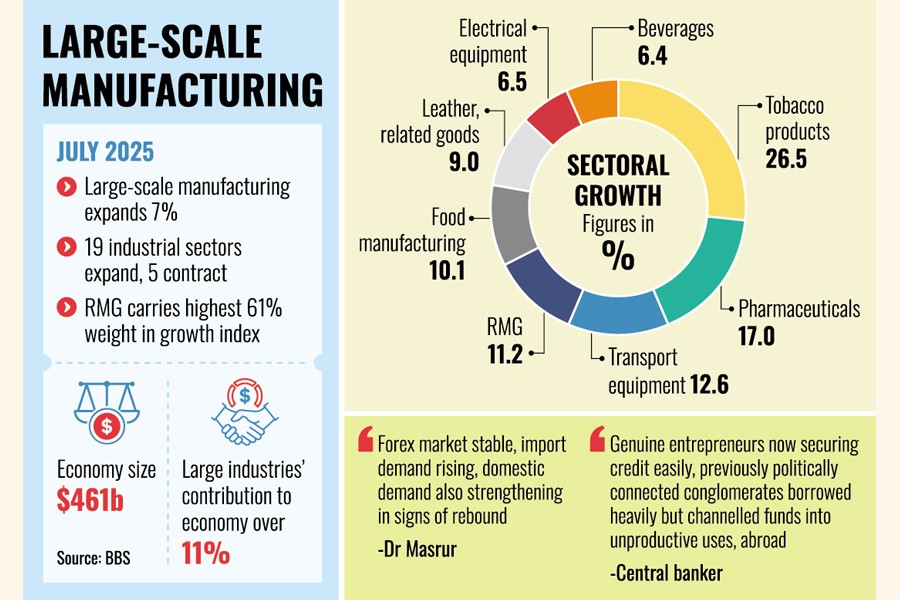Industrial throughput on upswing, economy shows steady pickup

Published :
Updated :

Large-scale manufacturing output is expanding, buoyed by a double-digit growth in dominant clothing sector amid a feel-good external ambiance, in signs of a steady economic pickup.
Bangladesh's large-scale manufacturing output expanded nearly 7.0 per cent in July, the first month of the 2026 fiscal year, according to official data.
The industrial production index, published by the Bangladesh Bureau of Statistics or BBS, is a key barometer of economic activity, with large industries contributing more than 11 per cent to the country's US$461 billion economy.
The ready-made garment sector, which carries the highest weight in the index at 61 per cent, posted a 11.2-percent year-on-year growth in July. Out of 23 industrial sectors tracked, 19 expanded during the month while five recorded contractions.
Tobacco products led the gains with 26.5-percent growth, followed by pharmaceuticals at nearly 17 per cent, transport equipment at 12.6 per cent, food manufacturing at 10.1 per cent, leather and related goods at almost 9.0 per cent, electrical equipment at 6.5 per cent and beverages at 6.4 per cent.
By a contrast, textiles shrank 4.2 per cent. Output of motor vehicles, trailers and semi-trailers declined 8.4 per cent, coke and refined petroleum products dropped 3.0 per cent, while machinery and equipment as well as chemicals both fell by less than 1.0 per cent each.
Economists and manufacturers attribute the overall growth mainly to the robust performance of the clothing industry and several allied sectors, which they think signals a gradual rebound in the broader economy.
They have also pointed to a relatively favourable external environment that could underpin stronger activity in the months ahead.
"The manufacturing sector is clearly on an upswing in a turnaround," says Dr M Masrur Reaz, chairman and chief executive of the think-tank Policy Exchange Bangladesh.
"The forex market is stable, import demand is rising, and domestic demand is also strengthening. But inflationary pressures need to ease further to create a more investment-friendly environment."
A senior Bangladesh Bank official, who asked not to be quoted by name, said allied industries supporting the RMG sector were benefiting from a shift in business following the easing of tariffs by the US government.
He mentions that genuine entrepreneurs are now securing credits more easily, in contrast to an earlier period when "politically connected conglomerates borrowed heavily but channelled funds into unproductive uses and abroad".
"To my mind, the genuine businesses are now getting loans, while the large corporates involved in plundering money are no longer in the market," the official says. "For this reason, private-sector-credit growth appears lower, but the quality of lending has improved."
He, however, feels that Bangladesh needs a large volume of FDI to give the economy a big push as the country's gross domestic savings remained stuck at around 23 per cent.
jasimharoon@yahoo.com


 For all latest news, follow The Financial Express Google News channel.
For all latest news, follow The Financial Express Google News channel.